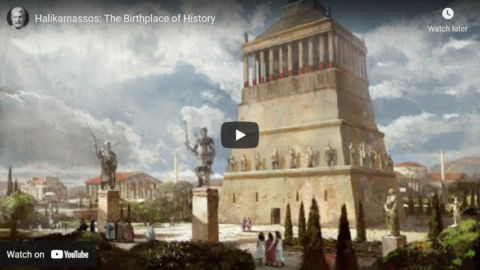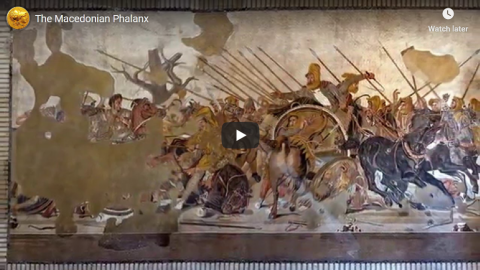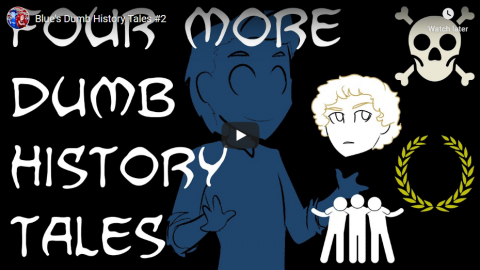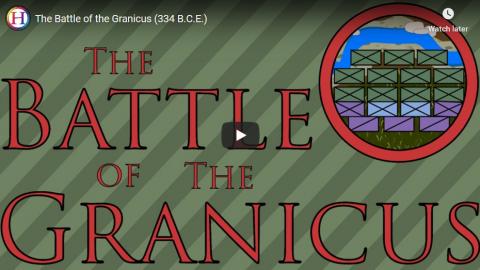Thersites the Historian
Published 24 Feb 2020A Greek polis which became the capital city of a Persian satrapy, Halikarnassos is best known as the birthplace of Herodotos and the site of the Mausoleum. A monarchy in a sea of aristocratic and oligarchic governments, Halikarnassos was one of the more unique places in the wider Greek world.
Patreon link: https://www.patreon.com/thersites
PayPal link: paypal.me/thersites
Twitter link: https://twitter.com/ThersitesAthens
Minds.com link: https://www.minds.com/ThersitestheHis…
Steemit/dtube link: https://steemit.com/@thersites/feed
BitChute: https://www.bitchute.com/channel/jbyg…
Backup Channel: https://www.youtube.com/channel/UCUrD…
November 3, 2021
Halikarnassos: The Birthplace of History
August 30, 2021
The Worst Withdrawal from Afghanistan? (330 BC)
Invicta
Published 28 Aug 2021Afghanistan has a long history of foreign invasions and withdrawals. Today we explore the first of these chapters with the campaigns of Alexander the Great. Signup for your FREE trial to Wondrium here: http://ow.ly/C3xs30rNLaU
As the last chapter of the US war in Afghanistan appears to draw to a close, the world watches armed and civilian forces alike conduct their final evacuations. However in these moments we hear echoes of the past. The history of the so-called “Graveyard of Empires” is filled with many chapters that tell of yet another major power that has been forced to withdraw after years of spilled blood and treasure. The most well-known instances have occurred in recent memory. However the pages of Afghan history go back thousands of years. Today I wanted to take a look at one of these first major military withdrawals that may just be the most FUBAR one on record; The evacuation of Alexander the Great’s Macedonian army from Afghanistan.
In order to contextualize this conflict we first begin with a quick overview of the history of Afghanistan. No country existed by that name or with those borders in antiquity and it was instead made up of a variety of tribal coalitions and minor kingdoms for much of its early history. However it would first see foreigners begin to claim its lands with the rise of the Median Empire and the succeeding Achaemenid Empire. The lands of modern Afghanistan would now be carved into a series of Satrapies such as Bactria, Gandara, Arakhosia, Drangaian, and Areia.
Following the Ionian Revolt and the Greco Persian Wars, the Kingdom of Macedon would rise to power and take on this ancestral conflict as a way to unify the Hellenic world behind its rule. Phillip II first began to plan and invasion of the Achaemenid Empire but it would be Alexander the Great who carried out this vision. He would campaign for several years through Anatolia, the Levant, Egypt, and Mesopotamia, consuming vast swaths of the enemy’s domains. However King Darius would escape to the east. Alexander initially pursued the Great King but when he was killed by his own Lieutenant, Bessus, Alexander set off against this traitor.
In this chase, Alexander the Great would be sucked into a multi-year war to subdue the eastern satrapies that made up modern Afghanistan. We cover the most significant events of this campaign, the establishment of occupying forces, and the eventual withdrawal of the army following the death of Alexander the Great. The ensuing settler revolt would make it (in my eyes) one of the most FUBAR Afghanistan withdrawals in history that would certainly be worthy of a Vice news documentary had it existed.
The Campaigns of Alexander the Great by Arrian
In the Footsteps of Alexander the Great by Michael Wood
Alexander the Great and Bactria: The Formation of a Greek Frontier in Central Asia by Frank Holt
The Greeks in Bactria and India by W. W. Tarn
On the revolt of the Greek settlers by DiodorusCredits:
Research: Invicta
Script: Invicta
Narration: Invicta
Artwork: Penta Limited#History
#Afghanistan
#Documentary
July 16, 2021
QotD: Thebes
John Stuart Mill rated the Athenian triumph at Marathon as more important in English history than the battle of Hastings. Did he mention the almost immediate humiliation, by the Athenians, of their victorious general Miltiades? After his brilliant victory at Salamis, ten years later, Themistocles was banished from Athens and ended serving the Persians whose fleet he had destroyed. A tough house to play, old Hellas. The Athenians did the chat; the Spartans the silences. And Thebes? Supplied settings and plots, mostly in the form of awful warnings.
Paul Cartledge makes the case for a central historical role for Oedipus’s home town. As scholarly as he is revisionist, his handsomely garnished Thebes is neither freckled with footnotes nor fancy with Gibbonian phrases. The Thebans’ exceptional capacity for disastrous decisions begins in mythology with the rejection by king Pentheus of the androgynous divinity Dionysus, dramatised in Euripides’s Bacchae.
There followed the king’s death at the hands of his own raving, Bacchanalian mother and the seismic ruin of the city. Homosexuality has no place in Cartledge’s index, but Oedipus’s father Laius, mythical king of Thebes, is the first man said to have swung both ways. The Sacred Band, in classical times, was a select Theban formation of pairs of male lovers, all full citizens.
However gay ancient Hellenes were (not all that, some say, certainly not all), the Sacred Band’s reputation suggests that a zest of scandal accompanied its bravura. Sexual aberration was integral to their city’s fame. Oedipus’s inadvertent marriage with his own mother, Jocasta, led to the mutual slaughter of their sons, as well as to the refusal of his daughter Antigone to marry Haemon, the prince chosen for her by King Creon. Creon then walled her up, the original ochi (NO!) girl. It needed the Athenian Sophocles to make a play out of it. Modern Greeks celebrate ochi day every 28 October, anniversary of the date in 1941 when their dictator, Ioannis Metaxas, refused to surrender to Mussolini and so refurbished himself as a national hero.
Thebes and the confederation of Boeotian states it headed figured on no honours board during the fifth century BC, presumed, until recently, to be the Golden Age of ancient Hellas. When Xerxes marched into Greece in 480 BC, the Theban oligarchs took advice from the Delphic oracle — they may well have leaned on it first — and so had a divine excuse for not offering any obstacle to the barbarian invaders.
Half a century later, the Thebans’ levelling of plucky little Plataea, the Athenians’ sole ally at Marathon, was a lowlight of the Peloponnesian war. It was matched only by their vindictiveness after defeating an Athenian army (including infantryman Socrates and the subaltern Alcibiades) at Delium. They left the enemy dead to rot rather than hand over the bodies.
[…]
Mythical Thebans figure again and again in the work of the great Athenian dramatists, almost always as bad examples. The city and its neighbours may have originated political federation, but it produced no remarkable artist, no Demosthenic orator, no great dramatist. As far as the arts are concerned, Cartledge cites only Pronomus, the pied piper whose mastery of the aulos (not so much flute as “double-oboe”) won wide renown. Nostalgic seniors may recall Danny Kaye’s line, “The oboe, it is clearly understood / Is an ill-wind that nobody blows good.”
Thebes specialised in wrong turnings. During its two decades of ascendancy in the fourth century BC, it sought to keep Macedon in its place by holding the young Philip II hostage. Having learnt the military skills of his captors, the unforgiving outsider returned to chasten them. His son Alexander finished the job by literally flattening the city, save for the house of its greatest poet, Pindar, and the temples of gods whose favours he hoped to enjoy when he set off to purge and pillage the Persians. No second Pindar hymned his conquests; the Greeks never took him for one of their own. His death in his early thirties prompted an immediate rebellion against Macedonian dominion.
Frederic Raphael, “Thick as Thebans”, The Critic, 2021-03-25.
May 9, 2021
Why Siege Towers are Wrong – History and Evolution
Invicta
Published 1 Feb 2021The depiction of siege towers as massed, glorified troop elevators in most modern media is completely a-historic. In this video let’s reveal the true history of the Siege Tower.
Check out The Great Courses Plus to learn about daily life in the past: http://ow.ly/DWyz30rsjSX
In this video we explore the history of siege warfare and in particular the siege tower. This begins with our earliest civilizations in the Fertile Crescent. It is here in ancient Mesopotamia that people like the Assyrians began to experiment with new siege technology such as the siege tower. We look specifically at the best example of Assyrian Warfare and the Assyrian army with the Siege of Lachish. From here, siege technology would spread to nearby Egypt and across the Mediterranean. The Greeks picked it up and helped push the technology forward with great application in the campaigns of Alexander the Great. The Roman Army then adopted the Siege Tower and worked to perfect its application. We then finally turn to the use of the Siege Tower in the middle ages. Along the way we cover lots of specific examples like The Siege of Alesia, The Siege of Jerusalem, the Siege of Masada and much more.
#History
#Documentary
February 9, 2021
History Summarized: Alexander the Great
Overly Sarcastic Productions
Published 19 Sep 2017Linguistically speaking, Alexander means “Defender of Men” from the Greek “alexo“, defend, and “aner/ander“, man. I’ll never be able to not internally think of his name as just meaning “Alex-Man”.
Oh, yeah, also he conquered an empire or something? IDK. I stopped paying attention after his bland name.
PATREON: www.patreon.com/OSP
MERCH LINKS:
Shirts – https://overlysarcasticproducts.threa…
All the other stuff – http://www.cafepress.com/OverlySarcas…Find us on Twitter @OSPYouTube!
August 11, 2020
The Vanishing Aral Sea
The History Guy: History Deserves to Be Remembered
Published 22 May 2017The History Guy examines the Aral Sea and the confluence of geography and history.
The History Guy uses images that are in the Public Domain. As photographs of actual events are often not available, I will sometimes use photographs of similar events or objects for illustration.
Patreon: https://www.patreon.com/TheHistoryGuy
The History Guy: Five Minutes of History is the place to find short snippets of forgotten history from five to fifteen minutes long. If you like history too, this is the channel for you.
Awesome The History Guy merchandise is available at:
teespring.com/stores/the-history-guyThe episode is intended for educational purposes. All events are presented in historical context.
#history #thehistoryguy #worldhistory
February 4, 2020
The Macedonian Phalanx
HistoryMatters
Published 30 Jan 2016A short introduction to the Macedonian phalanx, from conception to demise.
January 11, 2020
Logistics of Alexander the Great in His Campaign
Military History Visualized
Published 11 Jan 2016Patreon: https://www.patreon.com/join/mhv
Alexander the Great is well known for his tactics on the battlefield. Some aspect that is often forgotten is that victory on the battlefield requires well supplied troops. This is especially true, because Alexander’s conquest covered a vast area.
See the YouTube description for a lengthy sources list.
January 4, 2020
Blue’s Dumb History Tales #2
Overly Sarcastic Productions
Published 3 Jan 2020Happy new year, have some memes.
Our content is intended for teenage audiences and up.
DISCORD: https://discord.gg/y7uUnzJ
PATREON: https://www.Patreon.com/OSP
MERCH LINKS: https://www.redbubble.com/people/OSPY…
OUR WEBSITE: https://www.OverlySarcasticProductions.com
Find us on Twitter https://www.Twitter.com/OSPYouTube
Find us on Reddit https://www.Reddit.com/r/OSP/
December 2, 2019
The Battle of the Granicus (334 B.C.E.)
Historia Civilis
Published 30 Nov 2019Patreon | http://patreon.com/HistoriaCivilis
Donate | http://www.paypal.com/cgi-bin/webscr?…
Merch | http://teespring.com/stores/historiac…
Twitter | http://twitter.com/HistoriaCivilis
Website | http://historiacivilis.comSources:
Arrian, The Anabasis of Alexander, Book 1 | https://amzn.to/37F4qo3
Diodorus Siculus, “The Library of History,” Book 17 | https://amzn.to/2qPDP71
Plutarch, “Parallel Lives: The Life of Alexander” | https://amzn.to/2QUHXxu
—
Ernst Badin, “The Battle of the Granicus: A New Look,” from “Collected Papers on Alexander the Great” | https://amzn.to/37zeuyO
Peter Green, Alexander of Macedon | https://amzn.to/2OogimY
Robin Lane Fox, Alexander the Great | https://amzn.to/2OlzZvx
Philip Freeman, Alexander the Great | https://amzn.to/35wVtv4Music:
“IMF,” by Dot
“Heliograph,” by Chris Zabriskie
“Infados,” by Kevin MacLeod
“The House Glows (With Almost No Help),” by Chris Zabriskie
“Hallon,” by Christian BjoerklundWe are a participant in the Amazon Services LLC Associates Program, an affiliate advertising program designed to provide a means for us to earn fees by linking to Amazon.com and affiliated sites.
April 7, 2019
Epic Moments in History – The 9 Lives of Alexander the Great
Invicta
Published on 4 Sep 2017Alexander the Great is one of the most famous historical figures of all time. Yet many are unaware of the 9 times he cheated death over the course of his epic campaigns into the east!
Support future documentaries: https://www.patreon.com/InvictaHistory
Twitter: https://twitter.com/InvictaHistoryVideo Credits:
Research – Invicta
Script: Invicta
Narration – Invicta
Artwork – Robbie McSweeney (https://www.artstation.com/artist/rob…)Bibliography:
Alexander the Great by Phillips Freeman
The Campaigns of Alexander by ArrianMusic: “Rome: Total War OST” by Jeff van Dyck
“Total War: Rome II OST” by Richard Beddow
May 19, 2018
The Macedonian phalanx – structure and organization
Syntagma
Published on 19 Feb 2018A description of the Macedonian phalanx structure during the Alexander and Diadochi age, based on later written Asclepiodotos and Aelian infantry manuals.












